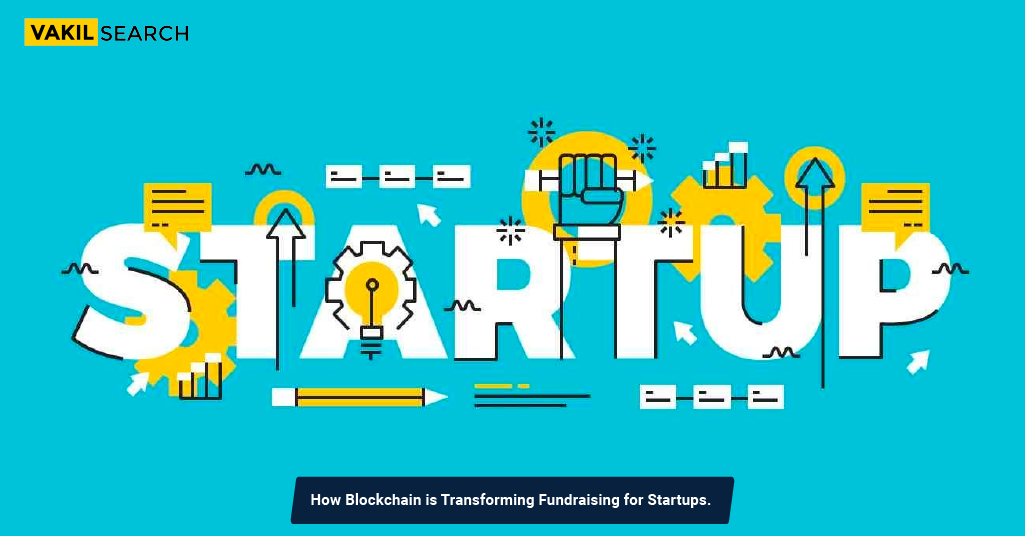Discover how blockchain revolutionises startup fundraising, its advantages, challenges, and the role of Vakilsearch in navigating the regulatory landscape.
Introduction
Blockchain technology has disrupted various industries, from finance to supply chain management. Among its many applications, one of the most intriguing is its potential to revolutionise fundraising for startups. In this article, we will delve into how blockchain is transforming fundraising for Startups. We will discuss Initial Coin Offerings (ICOs), token sales, and how blockchain can provide transparency in fundraising, ushering in a new era for entrepreneurial ventures.
Understanding Blockchain Technology
Blockchain is a distributed ledger technology that records transactions in a secure and transparent manner. It operates on a decentralised network of computers, ensuring that data is immutable, tamper-proof, and accessible to all participants. This technology forms the foundation for various cryptocurrencies, including Bitcoin and Ethereum, and extends its applications to fundraising for startups.
Transparency and Immutability
Blockchain’s transparency and immutability ensure that all transactions are recorded in a public ledger, visible to anyone on the network. This eliminates the need for intermediaries and provides a high level of trust and security, which is crucial in fundraising.
Smart Contracts
Smart contracts are self-executing contracts with the terms of the agreement directly written into code. They automatically execute when predefined conditions are met. Smart contracts enable automated and trustless fundraising processes, reducing the risk of fraud.
ICOs: A New Way to Raise Funds
Blockchain is Transforming Fundraising for Startups. Initial Coin Offerings (ICOs) emerged as a novel fundraising method enabled by blockchain technology. In an ICO, a startup issues its own cryptocurrency tokens to investors in exchange for capital. These tokens often represent a share of the project, utility within the platform, or a promise of future services.
ICO Process
- Whitepaper: Startups prepare a whitepaper outlining their project, including its goals, technology, team, and a tokenomics plan.
- Token Creation: The startup creates tokens on a blockchain platform like Ethereum.
- Crowdsale: Tokens are sold to investors during a specified ICO period, usually in exchange for established cryptocurrencies like Bitcoin or Ethereum.
- Listing: Tokens are listed on cryptocurrency exchanges, allowing investors to buy, sell, and trade them.
Advantages of ICOs
-
Global Accessibility
ICOs are open to a global audience, enabling startups to raise funds from a diverse pool of investors.
-
Speed and Efficiency
ICOs are often faster and more efficient than traditional fundraising methods like venture capital. They can be completed in a matter of weeks or even days.
-
Liquidity
Investors can trade tokens on cryptocurrency exchanges, providing liquidity and flexibility.
Token Sales: Beyond ICOs
While ICOs gained widespread attention, they are not the only way blockchain is transforming fundraising. Token sales have evolved to become more compliant and secure fundraising methods. Security Token Offerings (STOs) and Initial Exchange Offerings (IEOs) are examples of token sales that address some of the regulatory challenges associated with ICOs.
Security Token Offerings (STOs)
STOs involve the issuance of security tokens, which represent ownership in an asset or company, much like traditional securities. STOs are subject to regulatory oversight, making them a more compliant fundraising option.
Initial Exchange Offerings (IEOs)
IEOs are conducted on cryptocurrency exchanges, which act as intermediaries, vetting projects and providing a platform for token sales. This adds a layer of trust and security to the fundraising process.
Blockchain is Transforming Fundraising
Transparency is a fundamental challenge in traditional fundraising. Investors often have limited visibility into how their funds are used, and startups may struggle to prove their integrity. Blockchain technology addresses this issue by providing a transparent and auditable record of transactions.
Immutable Records
Once data is recorded on the blockchain, it cannot be altered or deleted. This ensures that all financial transactions are permanently documented and accessible to stakeholders.
Real-time Updates
Blockchain allows real-time tracking of funds raised and their allocation. Investors can monitor the progress of the project and ensure funds are used as intended.
Trust Building
Transparency builds trust between startups and investors. Knowing that their contributions are being used for the stated purposes can attract more investors.
Case Studies: Blockchain-Powered Fundraising Success Stories
Let’s explore a few case studies of startups that have leveraged blockchain technology to raise funds successfully.
-
Case Study 1: Ethereum
Ethereum, the second-largest cryptocurrency by market capitalisation, raised funds through an ICO in 2014. Ethereum’s ICO enabled them to secure capital for the development of their blockchain platform, which has since become a foundation for decentralised applications and smart contracts.
-
Case Study 2: Polkadot
Polkadot, a blockchain interoperability platform, conducted an ICO in 2017. The project raised over $145 million during its ICO, enabling it to continue developing its ambitious vision of a multi-chain future.
-
Case Study 3: Tezos
Tezos raised a record-breaking $232 million through its ICO in 2017. The project aims to provide a blockchain platform with on-chain governance, enabling token holders to vote on network upgrades and improvements.
Challenges and Considerations
While blockchain-powered fundraising offers significant advantages, it also presents challenges and considerations.
Regulatory Uncertainty
Regulatory bodies around the world are still grappling with how to regulate blockchain and cryptocurrency fundraising. Startups must navigate a complex and evolving legal landscape.
Scams and Fraud
The lack of regulation has led to the proliferation of scams and fraudulent ICOs. Investors must exercise caution and conduct due diligence.
Volatility
The cryptocurrency market is known for its price volatility. Startups that raise funds in cryptocurrencies may be exposed to price fluctuations.
Conclusion
Blockchain is transforming fundraising for startups. Blockchain technology has disrupted traditional fundraising models, providing startups with innovative methods like ICOs and token sales. These methods offer advantages such as global accessibility, efficiency, and transparency, transforming the landscape of startup financing.
As the blockchain space continues to evolve, startups and investors must adapt to new fundraising norms. Blockchain-powered fundraising is likely to play a prominent role in the future of startup financing, offering exciting opportunities for innovation and growth in the entrepreneurial ecosystem.
In this transformative journey, Vakilsearch also plays a crucial role. Vakilsearch’s expertise in legal matters, including compliance, regulatory issues, and documentation, can help startups navigate the complex and evolving regulatory landscape associated with blockchain fundraising. Our guidance can ensure that startups remain compliant with local laws while leveraging the benefits of blockchain technology.









